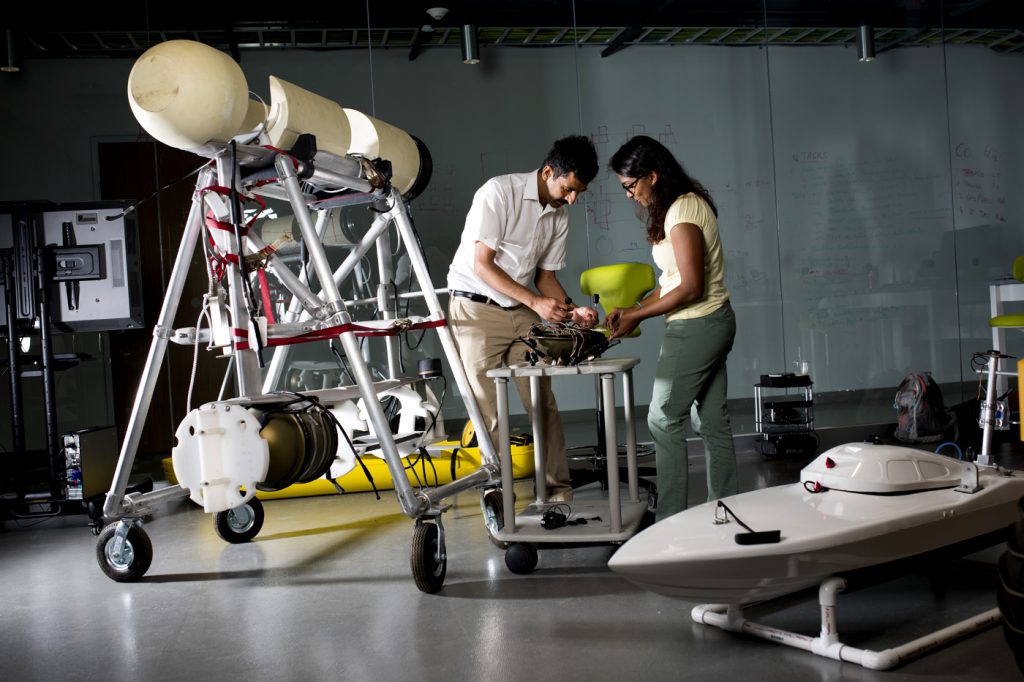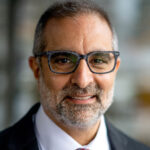


 The College of Engineering’s students and faculty are pushing boundaries in cornerstone disciplines—and in new and emerging fields, such as robotics and the internet of things, they are revolutionizing engineering education and research.
The College of Engineering’s students and faculty are pushing boundaries in cornerstone disciplines—and in new and emerging fields, such as robotics and the internet of things, they are revolutionizing engineering education and research.
With your support, we will also confront challenges in dwindling energy reserves, national security, coastal sustainability, transportation, and poverty. New biomachine interfaces will improve our lives. Resilient technologies will secure our homes. And advanced prediction systems will ensure the safety of our communities.
The College of Engineering invites you to help us advance our highest priorities:
Professorships. In academia, competition is fierce to recruit and retain extraordinary researchers, teachers, and mentors who are charting the future of their fields. By supporting a professorship, you will help attract world-class faculty fronting breakthroughs in specialties ranging from artificial intelligence to machine learning. Recognizing outstanding professors affirms confidence in the quality and outcome of an individual’s research; symbolizes an investigator’s contributions in advancing knowledge in their field; elevates an academic department’s prestige across the higher education landscape; and crucially, draws top students to the college.
Graduate student support. Our graduate students are collaborating to solve some of today’s most universal challenges. They are refining robot dexterity, growing renewable energy capacities, honing structural resilience to natural and manmade disasters, and probing security challenges spawned by the internet of things. To outpace peer institutions, we must continue to recruit and retain the brightest minds. Philanthropic support will provide graduate students with direct aid, and by lessening or removing financial obstacles, deliver the freedom to focus on valuable research and investigative experiences.
Student programs. The college’s broad mix of experience-based education programs—including co-op, student research, service learning, and global learning—build the connections that enable students to transform their lives and the lives of others. These connections enrich classroom studies, fuel intellectual and personal growth, and provide students with opportunities to explore their path and discover their passion. With these points of real-world engagement, our students are better prepared to succeed in the lives they choose.
Research. The challenges facing today’s engineers require collective action, from devising solutions to issues of national security to the environment, from transportation to medicine. Our research initiatives emphasize our unique capabilities to transform engineering knowledge, and we seek to create new research institutes, programs, and academic departments to forge novel routes to discovery.

With your support, we will also confront challenges in dwindling energy reserves, national security, coastal sustainability, transportation, and poverty. New biomachine interfaces will improve our lives. Resilient technologies will secure our homes. And advanced prediction systems will ensure the safety of our communities.
The College of Engineering invites you to help us advance our highest priorities:
Professorships. In academia, competition is fierce to recruit and retain extraordinary researchers, teachers, and mentors who are charting the future of their fields. By supporting a professorship, you will help attract world-class faculty fronting breakthroughs in specialties ranging from artificial intelligence to machine learning. Recognizing outstanding professors affirms confidence in the quality and outcome of an individual’s research; symbolizes an investigator’s contributions in advancing knowledge in their field; elevates an academic department’s prestige across the higher education landscape; and crucially, draws top students to the college.
Graduate student support. Our graduate students are collaborating to solve some of today’s most universal challenges. They are refining robot dexterity, growing renewable energy capacities, honing structural resilience to natural and manmade disasters, and probing security challenges spawned by the internet of things. To outpace peer institutions, we must continue to recruit and retain the brightest minds. Philanthropic support will provide graduate students with direct aid, and by lessening or removing financial obstacles, deliver the freedom to focus on valuable research and investigative experiences.
Student programs. The college’s broad mix of experience-based education programs—including co-op, student research, service learning, and global learning—build the connections that enable students to transform their lives and the lives of others. These connections enrich classroom studies, fuel intellectual and personal growth, and provide students with opportunities to explore their path and discover their passion. With these points of real-world engagement, our students are better prepared to succeed in the lives they choose.
Research. The challenges facing today’s engineers require collective action, from devising solutions to issues of national security to the environment, from transportation to medicine. Our research initiatives emphasize our unique capabilities to transform engineering knowledge, and we seek to create new research institutes, programs, and academic departments to forge novel routes to discovery.

“Northeastern’s College of Engineering is an ideal environment to bridge engineering with society. For more than a century, interdisciplinary collaboration and engagement with the real world have been our guiding principles. The college is embedded in an environment of nimble ambition, where students and faculty eagerly pursue collaborations that are problem-centered, not disciplinary-centered.”
—Gregory Abowd, Dean

Click here to learn more about supporting the College of Engineering, or contact:
Robert Silk
Senior Associate Vice President of
Development
617.373.6554
[email protected]


